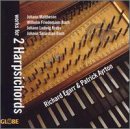| All Artists: Johann Mattheson, Wilhelm Friedemann Bach, Johann Ludwig Krebs, Johann Sebastian Bach, Richard Egarr, Patrick Ayrton Title: Works for 2 Harpsichords Members Wishing: 1 Total Copies: 0 Label: Globe Release Date: 2/15/1999 Genre: Classical Styles: Chamber Music, Forms & Genres, Concertos, Historical Periods, Baroque (c.1600-1750), Classical (c.1770-1830), Instruments, Keyboard Number of Discs: 1 SwapaCD Credits: 1 UPC: 789368853427 |
Search - Johann Mattheson, Wilhelm Friedemann Bach, Johann Ludwig Krebs :: Works for 2 Harpsichords
 | Johann Mattheson, Wilhelm Friedemann Bach, Johann Ludwig Krebs Works for 2 Harpsichords Genre: Classical
|
Larger Image |
CD Details |
CD ReviewsFine performances Claude Greenmount | The Universe | 02/14/2007 (4 out of 5 stars) "Two of the works featured here are fairly well known, JS Bach's concerto in C and Wilhelm Friedeman's Concerto in F. Both are concertos without orchestral accompaniment, so-called because of the scale and scope of the works. Both are over 20 minutes long, and both instruments are fully integrated into the texture of the work. Neither keyboard is subordinate to the other for any great length of time, and both equally share virtuoso material.
JS Bach's is, contrapuntally, the more substantial of the two, and more energetically charged throughout. WF Bach's work is more laid back in the first two movements (Allegro Moderato and Andante) but the closing movement (Presto) pits both keyboards against each other, passing rapid-fire motives back and forth interupted by occasional unison passages that give real dramatic weight to those phrases-- there is no unison writing in the first and second movements, so the opening unison of the third movment really stands out and grabs our attention. The Krebs and Mattheson pieces are also interesting, especially the Mattheson Suite in G. Krebs' work is the most lightweight of the set, but still welcome. The playing is very fine, and the ensemble very tight and well controlled. Tempo choice however, seem almost frantic in a couple of instances-- namely the two Bach works. The first movement of JS Bach's C-major Concerto seems nearly directionless, with no arc or shape, simply because of the overly brisk tempo chosen-- the energetic writing simply presented as streams of 16th notes wandering at will. The second movment, Addagio ovvero Largo, has real beauty however, and the closing fugue is energetic without being frantic. To many people, the harpsichord is an instrument used to accompany singers or other instruments, and not a solo instrument, much less one to be doubled up (or tripled or quadrupled, as in the case of JS Bach's Concerto in a minor for four harpsichords), and this recording is a fine way to hear this rarely-heard music." |

 Track Listings (14) - Disc #1
Track Listings (14) - Disc #1